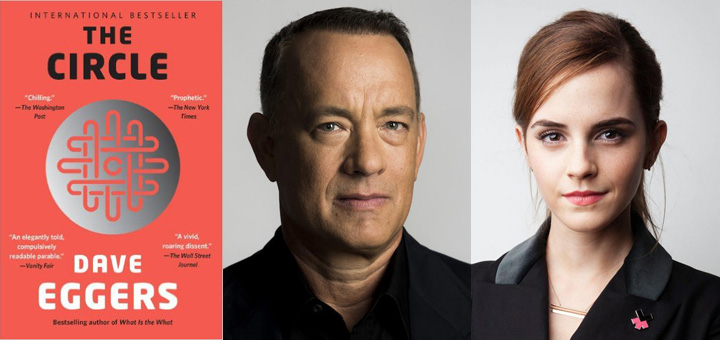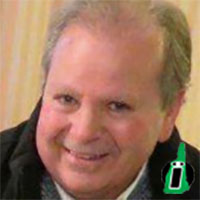By Bob Charest
Why Should You Care NH
And now for something a bit different: A book review and a movie review all rolled into one for this month’s column.
The book and the movie are both “The Circle,” Dave Eggers’ dystopian novel published in 2013 and recently released as a movie starring Tom Hanks and Emma Watson. The reason it is the topic of this column is because it is exactly what this column is about: the intersection of technology and privacy and how we must deal with them before they do us in.
Imagine working for a company that wants to know everything there is to know about you? I mean absolutely everything. This is a place that prides itself on having its employees connect on social media about everything, and when I say everything, I mean everything.
This is a company with 10,000 employees that specializes in ideas and then putting those ideas into the world: microchips embedded in the ankle bones of children so they will never be abducted, so that anyone will know at any time where their kids are. This is a place where small, cheap cameras the size of lollipops can be discreetly placed just about anywhere, and anyone can watch from a computer screen, ostensibly for public-spirited purposes such as keeping track of waves for surfing or cops for preventing assaults.
Or how about a dating app that allows users to find out if a certain someone has a gluten allergy, or what that person’s favorite food is. Just imagine how much better your date will go if you knew as much about the person as you could.
This is a world where your sense of community is measured – by the comments you make, the parties you attend, the interests you express.
Dave Eggers is previewing the new world, and the frightening part of his vision is that he is never that far off in any of the predictions he makes. Unlike other dystopian visionary novels (Aldous Huxley’s “Brave New World” or George Orwell’s “1984”) the world of the mega-corporation, The Circle, starts out with benign, usually benevolent intent. After all, how could anyone not love that children will never be kidnapped again?
Now I have to admit here that I am a moviemaker’s worst nightmare. I’m that person who reads the book and then goes to the movie expecting to see how the film adapts the story and more importantly, the characters, so that I can compare and contrast. To say that I was less than impressed is an understatement.
The only plot point that I was interested most in seeing adapted for film was left out entirely! Talk about a major bummer. That would be the segment of the book that includes sea creatures dredged up from the bottom of the Mariana Trench by one of the company’s co-founders on one of his globe-trotting expeditions. My (apparently) poor ability to spot movie gold was left wanting. I at least wanted to see special effects generate a see-through shark and it’s lightning-quick digestive system. No such luck. (Read the book. You’ll enjoy it.)
But what would I expect? A 514-page book made into a 110-minute movie … something’s gotta go.
In fact the movie did this leaving-me-wanting thing a couple of times. The mysterious man who Mae finds on campus is not so much of a mystery at all in the film. His role has been reconstructed, let’s say, and another lesser character (one of Mae’s other love interests, we’ll call him) is gone entirely. Certain plot points such as the whole dating app mentioned earlier are not part of the film. The film’s ending (no spoilers here) is not at all how the book ended.
I don’t consider this tale as much of a cautionary piece as much as I do the other, much older Huxley and Orwell visions created in a far-different, post-war period. Those stories told us what could happen in the future, and it is our mission to make sure it doesn’t. Eggers’ story is telling us what is happening, right now in the 21st century. Maybe we will do something about it, maybe we won’t.
And this is the major problem I had with the film. On screen, it looks like science fiction. On the page, it’s stuff that could really happen, and it is probably already happening. I was at a loss to know how the movie was affecting people with the concept that this stuff is not fantasy, something the book had made chillingly clear.
Trying to give the movie a fair chance, I attempted to distance myself from the book and ask what would I think had I not read the book? No matter how hard I tried, I couldn’t do that, so I asked my wife. She attended the showing with me, and she did not read the book. She felt the movie portrayed things that are fantastical, or put another way, pure science fiction fantasy.
I think Eggers wanted an entirely different effect. In his book, he showed how close we are to all these things depicted. He nailed it in his use of immediate job performance feedback in which the customer service reps are always trying to attain satisfaction reviews near 100 percent. Those who are pulling less are encouraged to send follow-up reviews, or they hear from a supervisor almost instantly that they had better bring those ratings up. This is a world where everything is rated, or scored. Is that so far off from where we are now? I don’t think so.
Mae Holland is the protagonist in this story. She is a rather naïve young woman who finds herself getting deeper and deeper into The Circle’s web as she tries to comply with her co-workers’ wishes so that she may keep her job and especially keep the health insurance her father, with advanced multiple sclerosis, so desperately needs.
The ex-boyfriend, Mercer, a regular guy who makes lighting fixtures out of old deer antlers, has the spotlight about halfway through the novel when he tells Mae that all this rating-everything business and living online is pure nonsense. He takes on the role I want to play every time I look around a restaurant and see people of all ages glued to their cellphone screens: People, live your lives!
His speech is more finely tuned. “… Don’t presume the benevolence of your leaders,” he tells her when she is trying to convince him all these technology gadgets are to make our lives better. “For years there was this happy time when those controlling the major Internet conduits were actually decent enough people. Or at least they weren’t predatory and vengeful. But I always worried, what if someone was willing to use this power to punish those who challenged them?” Later, in both the book and movie, we grow to think maybe Mercer was on to something here.
Later, Mae gets into some real trouble and has a heart to heart with one of the “three wise men,” the guys who founded the company. That chat revolves around the power of secrets. Eamon Bailey (played by Tom Hanks in the film) thinks secrets are never a good thing. In fact, he’d go as far as abolishing national security type secrets, the type that starts wars.
The movie is a little less clear on these points. The movie downplayed the whole “transparency” concept that in the book was overtaking the political landscape.
I read some advance promotions on the movie, and it was pointed out that this movie is being released in that “in-between” time in Hollywood: the time when the lackluster spring season blends into the summer blockbuster season. I know which end I think this movie falls on.
The fact that there were only 10 other people in the matinee with us at Hooksett’s Cinemagic on its first full day of release could be telling me something.
As I said earlier, read the book. Wait for the movie to come to Netflix or some other Internet movie site. Yes, I said Internet.
Bob Charest has been in the news business since 1977. He has worked at newspapers in Massachusetts and New Hampshire as a reporter and editor. A graduate of Boston University, he has consulted with InDepthNH.org on editing and grant proposals since before its founding in 2015. He write on topics related to advances in technology and how they have affected our privacy in America.






